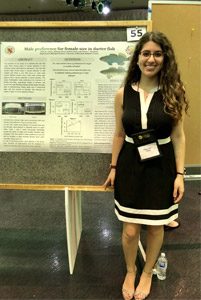Major: Biological Sciences
Minor: Music

Abstract: Male Preference for Female Size in Darter Fish. Our research focused on male preference for female size within the same species to determine whether male preference plays a part in mate choice
Who is your mentor? Why did you choose them?
My mentor for my project is Dr. Tamra Mendelson from the Biology Department. Dr. Mendelson was my professor for Bio 142 my sophomore year which was where I learned about her lab and research. The past two years have been absolutely amazing, and she has been one of the best mentors I ever could have asked for. She has always been supportive, caring, and understanding, and I have learned a great deal under her wing.
How did you become interested in this project?
I fell in love with Dr. Mendelson’s lab and research when she began to correlate the material in her Bio 142 lectures to her research. I knew that I would not have the opportunity to conduct research focusing on evolution in medical school, so I took the initiative to allow myself to have this opportunity during my undergraduate career.
What has been the hardest part about your research/What was the most unexpected thing about being a researcher?
The hardest part about research is having the patience to conduct experiments over and over again when they fail or do not go your way. New experiments will always have a trial and error period, and you will have to continuously change your protocol to get the results you are trying to obtain. But to do this, you must have the patience to work around the difficulties that arise.
What has been the most rewarding part?
The most rewarding part is the knowledge and mentorship I have gained. There are so many aspects of evolutionary biology and ecology that I would have never fully understood just by taking an introductory course. And there are many life lessons that I have learned and been to apply to my life because of my experiences in this lab. Dr. Mendelson and the graduate students, Sam Hulse and Natalie Roberts, have taught me a great deal these past two years. I know that I can always rely on them if I am having a difficult time understanding what is going on or having a hard time with my research.
How will you disseminate your research?
I have presented this research at URCAD 2018, and will be presenting this research at ABRCMS 2018 this November!
What is your advice to other students about getting involved in research?
Make sure that when you are choosing your lab you are choosing one that interests you and that you are passionate about. There will be some weeks where you will have to get up around 5-6 in the morning to go into lab to run experiments or just to help out in lab. You will have weeks where you will spend 20+ hours in lab. There will be so many experiments that you will mess up and have to redo. All of these can take a toll, but when it encompasses what you are passionate about then it is incredibly worth it.
What are your career goals?
I am aspiring to obtain my M.D./M.P.H.
11/19/18